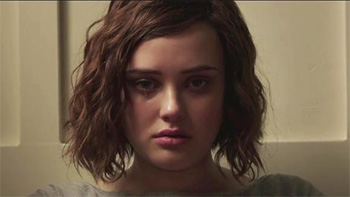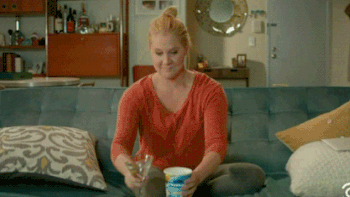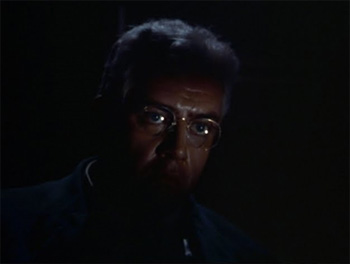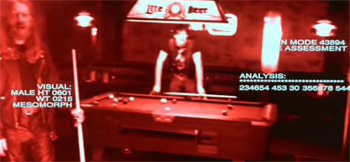6 Minor Movie Details That Always Mean One MAJOR Thing

The beauty of movies being a visual medium is how a good filmmaker can develop a character without a single spoken word. Reading "man punches meat" paints a very different picture than seeing Rocky in the freezer, turning a frozen cow into ground beef. The movie version instantly lets you know, just with visuals, that Rocky is the poor underdog with heart and ingenuity. It's its own kind of language.
Unfortunately, filmmakers sometimes create new words in this language, and suddenly what was once an insane or unusual thing becomes the default way to explain a character to an audience. For example ...
A Girl Getting A Haircut Means She's Dealing With A Traumatic Experience
We all deal with tragedy in our own ways. Some people might seek out support from their friends and family, while others will do the complete opposite and hide from the world. Maybe you run, or binge-drink, or stalk families as commanded by Crnobog's whispers. But if you're a girl in a movie or a TV show, you really only have one option: a sudden and drastic haircut. And if you're really traumatized, you do it yourself over the sink.
At some point, all fictional women apparently came together and decided that the best way to deal with violence, bullying, men, magic time amulet accidents, or work drama is a new look. Think back to how many times you've seen people in real life get a haircut. You probably told them you liked it, or if you didn't, awkwardly observed "You cut your hair." What you definitely didn't do was ask if they were attacked in a parking lot, or if they recently made a vow to kill their husband. And yet in a movie, we all know that's what her haircut means.
This happens all the time. In the recent Netflix show 13 Reasons Why, the main character starts with long hair. Later she cuts it, then kills herself. We would have included a spoiler alert, but she's a girl in an article about girls in TV shows getting haircuts, so you already knew what would happen.

Sometimes the resetting-your-life-with-a-haircut trope is played for laughs. In Mean Girls, we learn that after Regina George made fun of Janis for being a lesbian, Janis dropped out and "all her hair was cut off, and she was totally weird." But most times, these haircuts are very, very serious. In the movie Joy, Jennifer Lawrence gets swindled out of all her money. Explaining how that affected her character could be done with a scene of her at her bank, followed by a montage of her scowling over bills and repo men. Or you can do what they did:

It's not impossible for a real human person to deal with adversity by running to a mirror and hacking off their own hair. Do whatever makes you feel better. But it is truly strange how every single fictional girl does this. Hannah Horvath from Girls goes full haircut after a mental breakdown, and you know she's serious because she uses dull-ass utility scissors. Her life is so out of control that she has to chomp and chew her hair off.

You might remember this from another HBO show, The Newsroom, in which Maggie dealt with trauma in Uganda. The show kept the details a secret from the viewers for a while, but it was obvious they were bad, because she took a pair of scissors to her head and her hair went from "long and blonde" to "wad of cranky orange shapes." In real life, you would call it a silly and terrible decision. On TV, you call it a terribly serious and gritty reboot of her character.

Blue Dresses Mean Big Power
The "girl exploring an unknown and hostile world" is a common starting point for stories. Picture a wide-eyed girl getting out of a taxi in the big city and getting immediately robbed when she stupidly trusts a stranger with her suitcase. It happens every six seconds in real life and even more often in movies. It happens so often that Hollywood needed to come up with a visual cue to let viewers know that THIS particular woman is the predator, not the prey. And somehow they decided on "blue dress."
And we're not talking about a sleek navy power dress. No, filmmakers put a lady in a powdery, pastel blue dress when they want to show her as powerful. Dorothy in The Wizard Of Oz, Belle in Beauty And The Beast, Alice in Alice In Wonderland -- if you want a woman to go into a strange new world and kick it in the ass, you don't put her in tactical combat gear. You dress her in a pretty (maybe poofy and ruffly) sky-blue dress.

Cinderella was a weak-willed scullion maid getting bullied so badly that she had to talk to mice. But you give her a sparkly blue dress, and suddenly she has the confidence to land the most eligible bachelor in the land.

Once you start to look for it, you'll see it everywhere. In BioShock Infinite the female lead wears a blue dress. And it's not only cartoon ladies dealing with magical circumstances who wear them. In Devil In A Blue Dress, the costume designer never considered saying, "Making this lady look like trouble would be way easier if you guys called this movie Devil In A Pink Romper." In Sin City: A Dame To Kill For, they had to make Eva Green look like an unstoppable force of sexual domination. To show these traits, they put her in two different outfits: fully nude and, you guessed it, a blue dress.

Heartbroken People Want Ice Cream But Have No Bowl
It's not unusual for people going through a breakup to turn to comfort foods. It's probably why most people in an Arby's are crying. But in movies, this somehow always ends up being ice cream. And very specifically, ice cream straight out of the carton. TV and film have decided that no one looks sad eating a pizza or fries, but there is real tragedy in scooping ice cream out of its original packaging. How did this happen? Ice cream is the happiest food in the world. It's so wonderful that we don't even mind it being sold from noisy vans driving through our neighborhoods by men who are so obviously ritual murderers.
The quintessential example of boy-troubled girl whose only friend is ice cream is Bridget Jones:

And while this cliche does apply more to women than men, it's not completely gender-specific. When Chandler on Friends went through a bad breakup, he turned to the carton. He would have liked to deal with it through strippers, liquor, and sarcasm, but his male friends weren't there. And with only the girls to comfort him, he was forced to fix his heartache the lady way: ice cream. To be clear, the show wasn't so much subverting the gender angle as it was making another "Chandler is such a girly fruitcake" joke. Remember, it was hard to walk three feet in any direction in '90s pop culture without running into someone calling a guy a homo.

On the only other show about white professionals who hang out in New York, How I Met Your Mother, Lily also deals with her feelings by shoveling ice cream into her face. She makes the trope her own by using a wooden spoon.

It shows up in Hitch, Legally Blonde, Thor: The Dark World, the Bewitched remake, and countless other places. It's such a tired device that even the filmmakers using it know it's tired. This means they have to start adding a hook to it, like when Amy Schumer drowns her sorrows in ice cream in Trainwreck, but does so with a martini in a proper martini glass. The thing's even got a spear of green olives. It's a traditional classy cocktail that requires a person to own specialized equipment and ingredients, then go through a prohibitive series of steps to prepare it, and when you stick it next to a tub of ice cream, they still look like a lazy slob. That's how sad ice cream seems in movies.

Characters With Shiny Glasses Are Scary
An oddly specific way directors let you know someone is a real villain is to give them shiny spectacles. Glasses themselves give little away. A badass might wear sunglasses and a nerd might wear ordinary ones, but as soon as a bit of light glints off them, you can be sure they're evil. It's especially common in anime, where all true evil hides its eyes behind weirdly reflective eyeglasses.

It seems weird, but it's actually an old convention. Hitchcock might have been the first to use it back in 1954, in Rear Window. Somehow, the first time you see the neighbor's glasses reflecting light, you know he's the villain. I mean, look at this evil asshole:


Cool Hand Luke also employed this method to demonstrate which bad guy is the no-shit-fuck-your-life-up bad guy. The character in question is a prison guard in a movie in which the hero is a prisoner, so we weren't expecting him to be the comic relief, but when you see him scowl from behind glinting sunglasses, you instantly know he's pure sociopath.

You can almost tell the degree of humanity a character has by how much of their eyes show through their glasses. If they're a complicated villain driven by broken idealism, you might see some of their eyes. If those eyes are completely hidden behind sheets of white reflection, watch out, because they are the completely soulless kind of evil.

In Who Framed Roger Rabbit, the main antagonist wants to get rid of all the fun cartoon characters so badly that he creates a special acid capable of killing them. You might think "Who would want to do that?" until you see Judge Doom and his fully shiny glasses.

In Sin City, there's a character who speaks only in fingernail karate. How do you make someone like that anything other than rad? Well, they cast Elijah Wood, gave him a Bible and a Charlie Brown sweater, and most importantly, put him in fully shiny glasses.

Bad Guys Play Pool
Pool is a rather ubiquitous game. Someone in your family probably has a pool table in their basement. Statistically, someone in your family also has a box of children's teeth that they kept from when they worked as an ice cream truck driver. It supports our point, which is that whenever you see someone playing pool, they're a bad guy. The world's most ordinary parlor game somehow became the hobby of killers and badasses in every movie.
In My Cousin Vinny, Joe Pesci walks into a country bar and beats one of the men there at pool. In our world, this kind of thing happens all the time, and we would never expect the loser to immediately attempt murder. And yet when exactly that happens in the movie, no one is surprised. Not even Vinny. Of course the man tried to kill him -- he's a billiards player! In a movie! It's weird, right? It's a universe in which everyone who plays pool is a murderer and the game itself makes them want to murder, but bar owners are still putting them in their bars?

In Terminator 2, Arnold Schwarzenegger walks into a bar fully nude and jacked beyond reason. And if he walked into a bar with only a dartboard, things would have been fine. But he walked into a bar with a pool table. They took one look at this terrifyingly powerful lunatic and instantly decided to kick his ass. As usual, it didn't go well, but the story always starts the same: criminal assault by pool player.

If you told Steven Seagal you can use a pool table to play a game, he would have no idea what you're talking about, because every time he's ever been near one, someone has tried to break a pool cue over his head. Nothing says "a fight is about to start" in a movie more than a pool table, and as moviegoers, we're somehow okay with it, despite many of us only getting into life-and-death battles once every five or six games.
If Your Nose Is Bleeding Or You Have A Cough, You Are About To Die
Everyone has had or will get a nosebleed at some point in their lives. They can be caused by anything from altitude to nose-picking to cocaine to punches. The point is, we know you were picking your nose, and all you need to do is jam a tissue up there for a few minutes and move on with your day. Unless you're a character in a movie. Then you're so, so about to die.
The instant and enduring classic The Butterfly Effect had to show that Ashton Kutcher had Punk'd himself (this joke brought to you by the year 2004) by time-travelling too much. You see, his chrono powers were taking their toll on his body, killing him from the inside out. But instead of showing that with a dinosaur bursting out of his chest or having him transform into Napoleon before flickering out of existence, they gave him a simple nosebleed. Because in a film, a little blood from the nose is as instantly lethal as a chest-bursting time raptor.

Even non-terrible films like Pan's Labyrinth might use a nosebleed to tell us how dead people are. The movie is a tornado of eyeballs and goo, and it's not clear what the rules are or what happens at the end. Until you see Ophelia's nose bleed. Then you know, without question, that girl's dead.

When Naomi Watts watches the cursed video in The Ring and she's doomed to die in a week, the movie lets us know this isn't some hoax or prank or hallucination. They give her a nosebleed to make it clear that YES, she's about to die from the curse of a very real ghost girl murderer. And when she manages to escape the curse, the movie can reassure us it worked by having her nose stop bleeding.

If you don't have the budget for all that nose blood, you can also mark your characters for death with a cough. Coughing, as you may know, is quite ordinary in real life. In fact, it's so ordinary that we literally treat it with candy. But in a film, a cough is certain doom. If you see a character coughing for any reason other than being bad at weed, the editor might as well skip right to their funeral scene. As soon as a cough left Nicole Kidman's lips in Moulin Rouge, you knew she was dead. And you were confident Doc Holliday was going to win every gunfight in Tombstone because once he coughed, you knew that was going to be his cause of death.
For more tropes that probably need a break, check out 18 Baffling Tropes Hollywood Can't Stop Using and 6 Absurd Action Tropes You Never Noticed And Can't Unsee.
Subscribe to our YouTube channel, and check out 5 Dumb Movie Tropes They Need To Bring Back, and other videos you won't see on the site!
Follow us on Facebook, and we'll follow you everywhere.